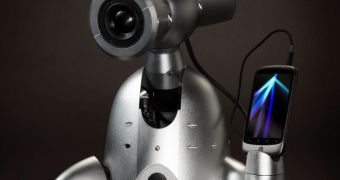Investigators from the Georgia Institute of Technology (Georgia Tech) Center for Music Technology have recently introduced Shimi to the world. Billed as a musical companion, the robot only functions with Android-enabled smartphones at this point.
In addition to looking adorable, the machine is also capable of providing quality entertainment. For starters, it is able to recommend new songs or artists based on what its users are already listening to.
It can also dance to the beat of the music it plays, and relies on user feedback to determine whether or not it should continue playing a tune, and at what volume. The smartphone-enabled machine is just one foot (33 centimeters) tall, but it packs a lot of features.
According to the Georgia Tech team behind the innovation, the official unveiling of the robot will take place at the Google I/O conference in San Francisco, California, on Wednesday, June 27. The presentation will feature three Shimi robots working together.
The machine will be introduced to the world by the Director of the Center for Music Technology, professor Gil Weinberg. “Shimi is designed to change the way that people enjoy and think about their music,” says the expert, who also designed the machine.
One of the features that will definitely constitute a selling point for Shimi is the fact that it's able to use the cameras and face-detection software on docked smartphones to figure out where the listeners are in a room, and then positions its speakers accordingly.
Another impressive feature is the robot's ability to analyze the sounds made when its owner claps a beat. It then scans the music library looking for a song with a similar or identical beat and tempo, and starts playing it back automatically. Then it starts dancing to the tune.
“Many people think that robots are limited by their programming instructions. Shimi shows us that robots can be creative and interactive,” Music Technology PhD candidate Mason Bretan explains.
In the future, the Georgia Tech team plans to introduce apps that will enable Shimi to recognize a variety of hand gestures. Users will be able to shake their heads in disagreement, and see the robot immediately change the track it's currently playing.
Other gestures could be used for skip or for turning the volume up or down. The range of development possibilities is virtually limitless, the team explains.
“I believe that our center is ahead of a revolution that will see more robots in homes, bypassing some of the fears some people have about machines doing everyday functions in their lives,” Weinberg concludes.

 14 DAY TRIAL //
14 DAY TRIAL //